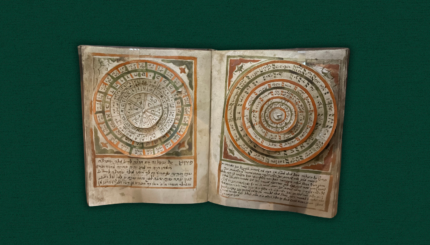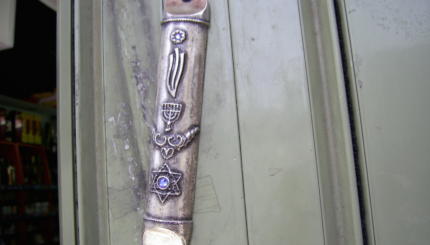Jen Abrams is an intern at MyJewishLearning.com
This weekend I returned to Dallas for a friend’s wedding. As the wedding party prepared for the toasts, my mom’s friend approached me and, ironically, asked me to explain Jewish death rituals to him. As it turned out, he had been to a funeral recently. He heard the rabbi mention that the family “stays at home†afterward and wanted the details of shiva. As I explained the ritual–and, of course, recommended he visit MyJewishLearning.com for more information–I flashed back to elementary school.
I was the only Jew in my school, located in a predominately Southern Baptist suburb of Dallas. When people had questions about Judaism, they came to me. I was the Go-to-Jew.
In elementary school I had no choice but to embrace this role–giving presentations about the menorah during Christmas time and toting around my copy of In the Month of Kislev. I explained over and over that no, I do not believe in Jesus, and no, I am not Hanukkan (no, this is not a real word), and no, I do not sing Christmas carols. I found myself teaching my friends the alef-bet on the playground and, in high school when I started observing the chaggim, struggling to explain to my teachers why I would not be in school for days at a time.
As the years went by, on my Dallas trips, the questions got more difficult. I no longer receive the simple, yes-or-no inquiries which my childhood peers asked. Now, adults ask me questions about beliefs and practices and request answers which represent not only my own understanding of Judaism or the views of my Jewish community, but those of all Jews.
When I have questions, which is often, I ask a rabbi, a website, a book–whatever, wherever, or whomever I can think of, so why can’t these people? I don’t consider myself any sort of authority, even though I feel like I am relatively knowledgeable. I guess I don’t trust myself to give the right answer. Ask me for my opinion anytime, but for “what Jews do,” I would way rather say, “Just Google It.”
When I haven’t been back to Dallas in a while, I sometimes forget that in New York, I am one of thousands. When I go back, I’m one in thousands. I feel like I have a responsibility to be an ambassador, a representative of Judaism, and I am. But being one of thousands certainly doesn’t mean I have all the answers.
menorah
Pronounced: muh-NOHR-uh, Origin: Hebrew, a lamp or candelabra, often used to refer to the Hanukkah menorah, or Hanukkiah.


